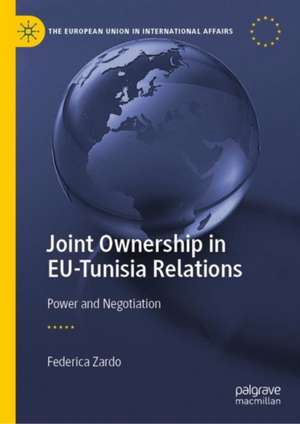Joint Ownership in EU-Tunisia Relations: Power and Negotiation: The European Union in International Affairs
Autor Federica Zardoen Limba Engleză Hardback – 8 oct 2019
This book provides an in-depth analysis of EU-Tunisia negotiations during the last three decades to understand what ‘joint ownership’ means in Euro-Mediterranean relations. The principle of joint ownership often figures in the EU’s public discourse of the EU and other international actors. Yet, it has been scarcely conceptualised and there is little research on which factors determine its presence or lack thereof. The book contributes to its definition, highlighting its evolving nature and intersubjective dimension. The author further explains how bargaining rules, practices, and procedures affect joint ownership by constraining or empowering actors, and shaping their expectations about which options they perceive are possible during the negotiations. Negotiation analysis proves useful for showing how, and to what extent, the interests of both sides eventually feature in Euro-Mediterranean agreements and enables scholars to bring back third countries' agency and perceptions into the study of the EU's external relations.
Din seria The European Union in International Affairs
- 15%
 Preț: 695.53 lei
Preț: 695.53 lei - 15%
 Preț: 499.12 lei
Preț: 499.12 lei -
 Preț: 351.66 lei
Preț: 351.66 lei -
 Preț: 392.60 lei
Preț: 392.60 lei - 18%
 Preț: 779.08 lei
Preț: 779.08 lei - 18%
 Preț: 1005.74 lei
Preț: 1005.74 lei - 15%
 Preț: 640.59 lei
Preț: 640.59 lei - 18%
 Preț: 787.61 lei
Preț: 787.61 lei - 18%
 Preț: 783.98 lei
Preț: 783.98 lei -
 Preț: 389.70 lei
Preț: 389.70 lei - 18%
 Preț: 778.76 lei
Preț: 778.76 lei - 18%
 Preț: 725.75 lei
Preț: 725.75 lei - 9%
 Preț: 679.86 lei
Preț: 679.86 lei - 15%
 Preț: 639.90 lei
Preț: 639.90 lei - 15%
 Preț: 639.90 lei
Preț: 639.90 lei -
 Preț: 389.70 lei
Preț: 389.70 lei - 18%
 Preț: 944.19 lei
Preț: 944.19 lei -
 Preț: 384.09 lei
Preț: 384.09 lei - 18%
 Preț: 781.77 lei
Preț: 781.77 lei - 15%
 Preț: 584.26 lei
Preț: 584.26 lei - 15%
 Preț: 467.79 lei
Preț: 467.79 lei - 15%
 Preț: 641.71 lei
Preț: 641.71 lei - 18%
 Preț: 898.13 lei
Preț: 898.13 lei -
 Preț: 408.66 lei
Preț: 408.66 lei - 18%
 Preț: 782.72 lei
Preț: 782.72 lei - 18%
 Preț: 784.79 lei
Preț: 784.79 lei -
 Preț: 390.63 lei
Preț: 390.63 lei -
 Preț: 387.75 lei
Preț: 387.75 lei -
 Preț: 382.36 lei
Preț: 382.36 lei - 15%
 Preț: 640.71 lei
Preț: 640.71 lei - 15%
 Preț: 642.36 lei
Preț: 642.36 lei
Preț: 384.09 lei
Nou
Puncte Express: 576
Preț estimativ în valută:
73.50€ • 76.89$ • 61.05£
73.50€ • 76.89$ • 61.05£
Carte tipărită la comandă
Livrare economică 02-16 aprilie
Preluare comenzi: 021 569.72.76
Specificații
ISBN-13: 9783030307981
ISBN-10: 3030307980
Pagini: 114
Ilustrații: XV, 122 p. 4 illus.
Dimensiuni: 148 x 210 mm
Greutate: 0.32 kg
Ediția:1st ed. 2020
Editura: Springer International Publishing
Colecția Palgrave Pivot
Seria The European Union in International Affairs
Locul publicării:Cham, Switzerland
ISBN-10: 3030307980
Pagini: 114
Ilustrații: XV, 122 p. 4 illus.
Dimensiuni: 148 x 210 mm
Greutate: 0.32 kg
Ediția:1st ed. 2020
Editura: Springer International Publishing
Colecția Palgrave Pivot
Seria The European Union in International Affairs
Locul publicării:Cham, Switzerland
Cuprins
Chapter 1 Introduction: Joint ownership in Euro-Mediterranean relations – Why it matters.- Chapter 2 Joint ownership and Euro-Mediterranean negotiations.- Chapter 3 Zooming in EU-Tunisia relations across the 2011 upheavals.- Chapter 4 Joint ownership under the authoritarian rule.- Chapter 5 Joint ownership in times of transition.- Chapter 6 Conclusion: Joint ownership is what actors make of it.
Notă biografică
Federica Zardo is Assistant Professor at the Centre for European Integration Research, University of Vienna, Austria. Her work deals with the EU´s external relations, in particular with Southern Mediterranean countries. Most recently, her research has focused on Euro-Mediterranean relations in the realm of migration. She has published in outlets such as the Journal of Ethnic and Migration Studies, International Politics, and the European Foreign Affairs Review.
Textul de pe ultima copertă
This book provides an in-depth analysis of EU-Tunisia negotiations during the last three decades to understand what ‘joint ownership’ means in Euro-Mediterranean relations. The principle of joint ownership often figures in the EU’s public discourse of the EU and other international actors. Yet, it has been scarcely conceptualised and there is little research on which factors determine its presence or lack thereof. The book contributes to its definition, highlighting its evolving nature and intersubjective dimension. The author further explains how bargaining rules, practices, and procedures affect joint ownership by constraining or empowering actors, and shaping their expectations about which options they perceive are possible during the negotiations. Negotiation analysis proves useful for showing how, and to what extent, the interests of both sides eventually feature in Euro-Mediterranean agreements and enables scholars to bring back third countries' agency and perceptions into the study of the EU's external relations.Federica Zardo is Assistant Professor at the Centre for European Integration Research, University of Vienna, Austria. Her work deals with the EU´s external relations, in particular with Southern Mediterranean countries. Most recently, her research has focused on Euro-Mediterranean relations in the realm of migration. She has published in outlets such as the Journal of Ethnic and Migration Studies, International Politics, and the European Foreign Affairs Review.
Caracteristici
Explores the dynamic concept of joint ownership Focuses on joint ownership in the context of the relationship between the EU and one of its most significant partners in the Southern Mediterranean Shows how institutions establish negotiation frameworks within which the relevant actors interact
